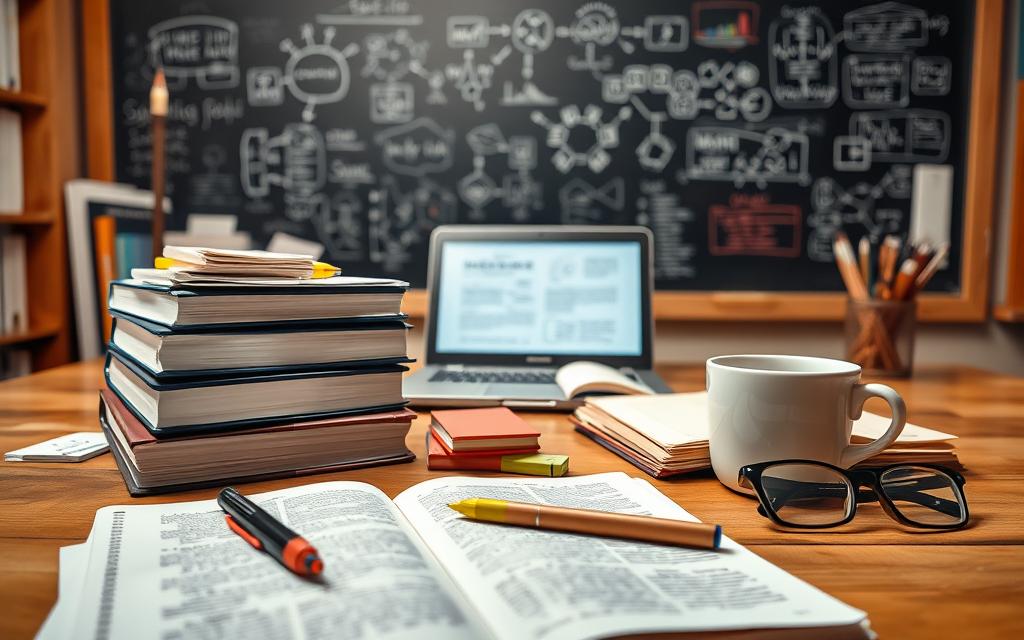Did you know effective study strategies can boost grades by up to 25%? This is a big deal for academic performance. In a competitive school environment, good study skills are key. They help you get higher marks and learn better for life. This article will share ten great ways to help American students study better and ace tests.
Understanding the Importance of Study Skills
Getting better at study skills is key to doing well in school. These skills help students learn and remember information more easily. When students move on to college, using good study methods is even more important.
This is because the right study habits can improve how well you understand topics. They also make learning more fun.
Why Study Skills Matter
For academic achievement, having strong study skills is vital. Students with good study methods learn and remember more. They avoid the stress of cramming at the last minute.
This way, they do better in classes and really get the topics they’re studying.
Impact on Academic Performance
Research shows that students who work on their study skills do better in school. Through effective time management, they create study schedules that work. This helps them remember things better, especially during tests.
Creating an Effective Study Environment
Having a great study environment is key to learning better. It is about cutting down on distractions and keeping your study materials organized. Doing this will help you focus more and do well in your studies over the long run.
Minimizing Distractions
To study better, you need a place with no distractions. Here are things you can do:
- Silence mobile phones to avoid interruptions.
- Avoid social media during study sessions.
- Choose quiet, comfortable spaces that encourage focus.
When you have fewer distractions around, you learn more and remember it better.
Organizing Your Space
Making your study area neat can really help with learning. Make sure you can easily reach your books, pencils, and tech stuff. A tidy place helps you think clearly and study better. Think about adding these:
- Proper lighting to reduce eye strain and enhance focus.
- Comfortable seating to maintain posture and prevent fatigue.
- Organization tools like shelves and binders to keep resources tidy.
Making these small changes can boost your study habits and help you do great in school.
Time Management Strategies for Students
Managing time well is key for students aiming for the top. Learning how to manage time can really boost study habits. Two effective strategies are the Pomodoro Technique and organizing tasks by importance.
The Pomodoro Technique
The Pomodoro Technique splits study time into 25-minute chunks followed by breaks. It keeps the mind fresh and focused. Using this method improves study skills and stops you from getting too tired. Research suggests that spacing out study times helps you remember more than cramming.
Students should sort their work by deadlines and how tough they are. Breaking big projects into smaller bits makes studying easier. This helps use time wisely, focusing on the most important jobs first. Making lists and using planners can keep you on track. These habits are great for studying better and doing well in school.
| Technique | Benefits |
|---|---|
| Pomodoro Technique | Boosts concentration, keeps you from burning out, and helps retain info better |
| Task Prioritization | Makes study more systematic, ensures tasks are done on time, and cuts down on delaying work |
Active Learning Techniques
Active learning techniques boost engagement and help students understand better. They let students interact with their study materials in meaningful ways. This interaction strengthens their learning and makes their study habits better. Let’s explore three effective ways to improve study strategies.
Summarization
Summarization is a key technique for taking notes that makes information short and clear. By focusing on the main ideas and rewording content, students get better at understanding the material. It helps them remember what they learn and makes studying for tests easier.
Questioning and Self-Testing
Self-testing is a strong way to get ready for tests. When students recall information actively, they remember it better than just reviewing notes. Using tools like flashcards and tests shows what they need to work on. This leads to better study habits and academic results.
Teaching Others
Explaining concepts to others, or even to oneself, is a good way to make sure you understand them. Teaching makes students learn the material well, improving their study skills and success in school. This method not only makes sure they know the material but also gives them confidence with difficult topics.
Utilizing Different Learning Styles
Understanding how we learn is key to doing better in school. By adapting to our learning styles, we can find the best ways to study. Knowing if we learn by seeing, hearing, or doing can make studying much easier.
Visual Learners
Visual learners do well when they see information. They benefit from using charts, diagrams, and videos. Tools like mind mapping can help them understand and remember better.
Auditory Learners
Auditory learners grasp things by listening. They learn through talks, lectures, and reading out loud. Being part of a study group can help them understand complicated topics better.
Kinesthetic Learners
Kinesthetic learners learn by doing. Adding activities like role-playing or games makes studying more effective. This approach helps them connect with the material and remember it better.
Setting Realistic Goals for Studying
Setting clear goals is key to improving study skills and achieving academic success. By having specific targets, students can choose the best study methods for them. This makes studying a focused effort.
SMART Goals
The SMART framework is great for setting effective study goals. Here’s what each part means:
- Specific: Be clear about what you want to achieve.
- Measurable: Have a way to see your progress.
- Achievable: Make sure your goals are possible.
- Relevant: Your goals should match your academic dreams.
- Time-bound: Give yourself a deadline to reach goals.
SMART goals help students build better study habits. They make you accountable and keep you motivated.
Short-term vs Long-term Goals
It’s important to have both short-term and long-term goals. Short-term goals give you quick wins, which boost your spirit. They also encourage good study habits.
Long-term goals provide a bigger purpose, guiding you towards lasting academic achievements. Having both types of goals helps keep your motivation up and improves your study skills over time.
Making Use of Study Groups
Study groups are great for improving your study skills. Working with friends opens up new ways of seeing things. It helps you feel part of something. You can better understand tricky topics by getting together. Sharing knowledge means sharing ways to study better. This helps everyone remember the information better.
Benefits of Collaborative Learning
Being part of a study group has many advantages:
- Diverse Perspectives: Each person offers new ideas that can make hard concepts clear.
- Mutual Support: Everyone pushes each other to keep going and reach their study goals.
- Resource Sharing: Students can share books, notes, and other helpful stuff.
- Enhanced Understanding: Teaching each other helps lock in what you’ve learned.
How to Form a Study Group
To start a good study group, just follow these steps:
- Select Committed Members: Pick people who are serious about their studies and share your goals.
- Establish a Schedule: Find a time to meet that works for everyone.
- Define Clear Objectives: Make sure each meeting has clear goals for what you want to achieve.
- Rotate Roles: Change up the roles like note-taking or leading the discussion to keep things interesting.
Leveraging Technology for Study Success
Technology is key in the digital age for improving study skills and academic success. There are many applications and online tools that help students study better. These tools make learning fun and productive.
Recommended Study Apps
There are apps designed for different study needs. They help students organize, track progress, and prep for exams. Some popular apps include:
- Quizlet: Offers flashcards and quizzes for better memory and interactive learning.
- Evernote: Perfect for note-taking, it keeps your notes organized and easy to access.
- Notion: A workspace for managing projects and teaming up, great for group work.
Online Resources and Platforms
Next to apps, online platforms offer extra learning help. Sites like Khan Academy and Coursera give videos and courses on many subjects. Using these platforms helps students learn more and strengthen key study skills.

Relaxation Techniques to Enhance Focus
To get better at studying, adding relaxation methods to your routine is key. It’s not only what you study that matters but also how you manage your mind. Many students are now using mindfulness and meditation to help focus better during their study times.
Mindfulness and Meditation
Starting mindfulness and meditation can really lower stress, helping students focus in a calm way. These practices make you more present, which helps get rid of distractions. This makes learning and remembering info easier. Trying out guided meditation can also help focus your thoughts, making your study time more productive.
Deep Breathing Exercises
Deep breathing exercises are also great for reducing study-related stress. The 4-7-8 technique is a good example. You breathe in for four seconds, hold it for seven, and breathe out for eight. This helps calm your nerves and brings peace, making studying more effective. Using these relaxation tips can boost your study habits and grades.




